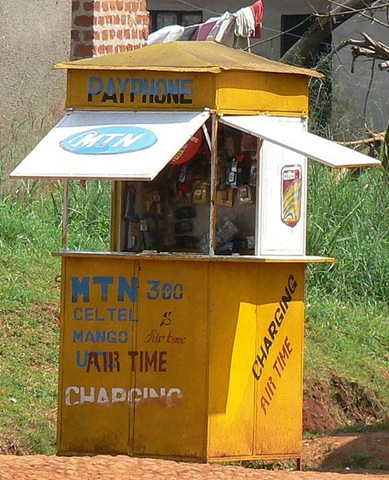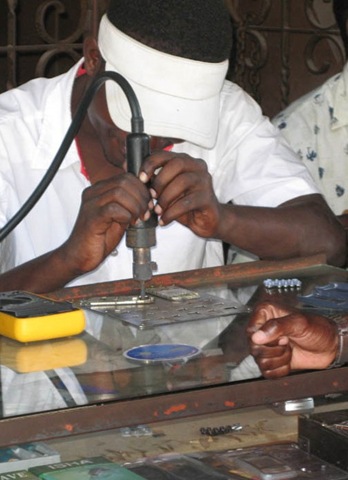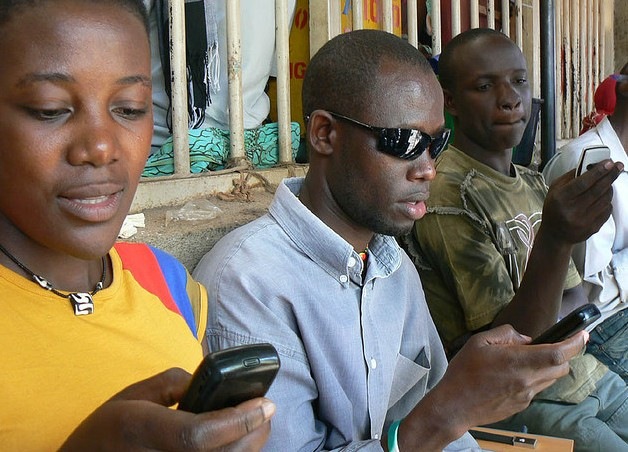Africa’s mobile phone kiosks: tech hubs set to rival Silicon Valley?

Photo Credit: Ken Banks, Kiwanja.net
In the West, there’s an app for everything. In Africa, so goes the latest business/development mantra, there’s the mobile phone kiosk. The noise around Africa’s diy mobile phone culture sometimes sounds like a faint repeat of the dotcom hype from 1990s San Francisco.
However, Africa’s kiosks are for real: in the last decade or so, mobile phone kiosks have appeared everywhere, on every African city street corner.
They add up to entrepreneurial ecosystems buzzing with innovative goods and services, claim the business pundits. It’s an MBA case study scrawled across an entire continent.
Your phone doesn’t take multiple sim cards? Not a problem. African kiosk hackers are able to re-engineer your phone so that two cards can fit into one sim slot. Need instructions for the phone you bought up country? Don’t worry. Chances are that the kiosk’s clever geeks can download and print off the manual for you.

Photo Credit: Ken Banks, Kiwanja.net
It’s innovation born out of necessity, suggests Ken Banks, founder of kiwanja.net, the non-profit behind FrontlineSMS, free text-messaging software for Africa-based NGOs.
“Some of the most exciting innovations happen in resource constrained environments,” says Banks.
“Anyone who travels around African countries will see people making things out of the most unlikely components and cobbling odd scraps together because really they have no other choice.”
What’s happening at the level of the street kiosks is a distant echo of the noise around African communication globally. Over the last decade, the international community has gradually turned up the volume on the idea of jumpstarting Africa’s economy via technology.
Rather than sending aid money into Africa, big business, development economists and NGOs and international institutions like the UN and the World Bank hope to encourage African development at home, from the phone kiosks up.
Celebrating innovation, US Secretary of State Hillary Clinton announced in a speech at the start of 2010 that new technologies meant that “billions of people” were about to “leapfrog into the 21st century after missing out on 20th-century breakthroughs”.
Infrastructure
Africa’s leapfrogging is a three-stage tech work in progress. First, there’s the external scaffolding.
The 2000s saw the push to provide the big infrastructure for Africa’s digital revolution. Gradually, the governments and then the corporations installed the phone masts and then the undersea cables. In the last year, large parts of Africa have finally become wired, linked via fibre optic to the global internet.
Wiring
The second stage is the internal wiring. The hope, in boardrooms in the City of London, in lecture theatres in Ivy League schools, is that the introduction of new technology, like mobile phones and the services associated with them, leads to a surge in African development.
The great Kenyan mobile phone success story has been M-Pesa, the hugely popular mobile money transfer service. In 2009, nearly half of all Kenyan cash transfers were by mobile phone.
Sign up with an M-Pesa agent to buy digital cash. Send the cash off by SMS to any mobile phone user in Kenya. They can swap the digital for real shillings by visiting their local M-Pesa agent.
Around 10 million customers, around 40 percent of the population, use M-Pesa. According to Safaricom, the Kenyan mobile phone provider running the service for Vodophone, the mobile service transferred the equivalent of 20 percent of Kenya’s GDP in 2010.
Perhaps it’s not surprising then that IBM’s Bruno Di Leo sees Africa as the “next major emerging growth market”.
Big Blue is providing the computing power for an upgrade to the mobile phone network operated by Zain Africa in 16 sub-Saharan African nations. It’s spending a cool $1.5 billion in Africa over the next ten years.
Zain Africa itself was bought up in June by India’s largest mobile phone company Bharti Airtel for a whopping $9 billion.
Kenyan mobile phone customers couldn’t be happier. There’s the better service. And, keen to get a bigger slice of the Kenyan market, Zain has cut its charges in half since the late summer.
In the current price war, other mobile phone operators have been forced to follow Zain’s example, cutting call charges in some cases by up to 75 percent. Meanwhile, Orange is giving away handsets to anyone buying $13 worth of airtime.
However, it’s not the handsets which matter, not in the long run. As M-Pesa demonstrates, the way in which mobile phones give real benefit to ordinary Africans is via the services they carry.
Farmers with mobile phones can find out market prices. Doctors can send healthcare information to nurses. Activists can keep tabs on election results.

Photo Credit: Ken Banks, Kiwanja.net
Economist and UN Special Advisor Jeffrey Sachs says that the digital revolution is putting “wind in the sails of development”.
The mobile web
The third stage in Africa’s great leap forward is universal access to broadband internet. With industry insiders expecting the announcement of cheaper smartphones aimed at the African market, the CEO of Opera, one of the leading mobile browser developers, says that the mobile web could amount to a “turning point” for Africa.
Jon von Tetzchner told South African tech journalists recently that Africa’s enthusiasm for mobile phones and services shows the continent is “jumping over years of tech development”.
He continued: “But the most important thing with all this development is that it’s easier to build things up by yourself. There is a great opportunity for Africans to build services locally and sell them locally.”
Key Facts
The rise in the number of Africans owning mobile phones has been incredible.
In 2000, 16 million Africans subscribed to mobile phones; by 2008, the number had gone up to 376 million – that’s a third of the population of sub-Saharan Africa.
However, it’s unlikely that mobile phone ownership in Africa is as widespread as this. Some people own more than one phone.
For the majority of Africans, phones remain an expensive luxury.
A cheap mobile phone in Kenya costs half the average monthly income.
Which explains the brisk trade around streetside mobile phone kiosks.
Key Trends
Fine tuning the platforms on which services like M-Pesa run, the big tech companies have made a point of tuning in to potential customers.
One method has been to send anthropologists into rural villages to find out how people live and what they need and want from new technology.
Relayed back to the design teams in Helsinki or London or San Francisco, the surveys have resulted in phones designed specifically for rural Africans.
Nokia has entry-level phones for the African market which use icons instead of text cues – not all of its customers can read and write.
PIN-protected multiple address books ensure privacy – unlike Europeans or Americans, Africans often share their mobile phones.
A version of this appears in the November issue of Bspirit, the Brussels Airlines magazine.